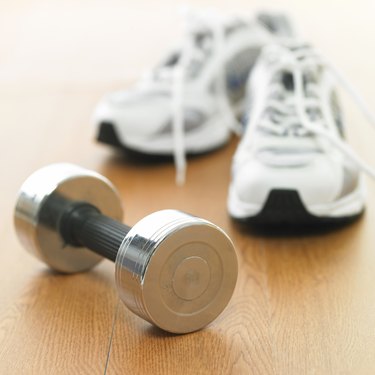
A tingly feeling when exercising is typically caused by a neurological or vascular problem. In its mildest or most harmless forms, the tingling could be the result of a bra strap that is too tight, or it could be related to blood pressure changes during the workout. Regardless of the location and cause of the tingling, you should pay attention if it is accompanied by other symptoms, such as pain, or if the pain or tingling doesn't dissipate after you stop exercising.
Chronic Exertional Compartment Syndrome
Video of the Day
When you exercise, your muscles expand by as much as 20 percent, and if the tissue around the muscles doesn't expand accordingly, the muscles can start to pinch on the nerves and blood vessels, Dr. Cathy Fieseler explains for "Running Times" magazine. This condition is known as chronic exertional compartment syndrome and is usually treated with surgery. Symptoms of CECS include a tingly feeling or numbness, often preceded by cramps or soreness, in the lower legs and feet.
Video of the Day
Popliteal Artery Compression Syndrome
Exercising can also cause the muscles in the lower leg to press on the popliteal artery, which runs behind the knee. Pressure on that large artery can restrict blood flow to the calves and feet and produce a tingly sensation and numbness as well as pain in the muscles. With this condition, as with CECS, a physician could only diagnose popliteal artery compression syndrome during and immediately after exercise, Fieseler explains. Surgery is also the way this problem is treated.
Sciatica
A tingly feeling that runs down the back of one leg from the back, though you may not feel it in the back, is likely sciatica. The sciatic nerve is simply the largest nerve in the body; it starts in the pelvis and runs down the thigh, where it branches into two smaller sections. When that nerve becomes compressed, the result can be a painful or tingling feeling down the affected nerve.
Considerations
You may feel tingly in your face, hands or feet, depending on what kind of exercise you're performing and at what intensity. Muscles tend to get sore when exercising, so it's important to distinguish between sore muscles and tingling ones. Sore muscles may get better with rest; tingling should be watched carefully. If the tingling occurs every time your exercise, consult your doctor. Be ready to answer questions about how the tingling feeling starts, how long it lasts, what helps make it go away and what, if any, medications and supplements you take.
Is this an emergency? If you are experiencing serious medical symptoms, please see the National Library of Medicine’s list of signs you need emergency medical attention or call 911.